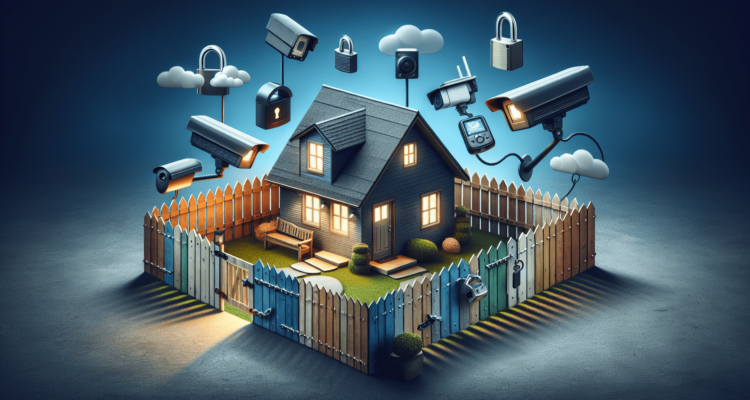Home Security System Review
Embarking on the journey to safeguard your home and those dearest to you, our “Home Security System Review” offers a rich tapestry of insights and expert evaluations aimed at fortifying your sanctuary. From understanding the multifaceted nature of home security to exploring innovative technologies and proactive prevention strategies, this article is your guide to comprehensive protection. It emphasizes the human touch in securing your personal spaces, ensuring that solutions not only offer robust security but also align with your lifestyle, providing peace of mind and empowering you with the knowledge to keep your haven safe today and tomorrow.
Understanding Home Security Systems
Definition and Basic Concept
Home security systems are designed to protect your home and family from a variety of threats, including intrusions, theft, and environmental dangers. Essentially, these systems are a network of interconnected devices that work together to secure entry points and alert you or the authorities of any potential security breaches. They give you peace of mind, knowing your loved ones and valuables are protected. A comprehensive home security system delves deeper than alarms and locks, assessing every potential vulnerability of your residence.
The Evolution of Home Security Systems
Initially, home security systems were fairly simplistic, consisting mostly of bolted doors and locked windows. Over time, technological advancements have revolutionized how we protect our homes. From the introduction of basic alarm systems in the early 20th century to today’s sophisticated, internet-connected security gadgets, the evolution of home security systems reflects advancements in technology and a deepening understanding of homeowners’ needs.
Key Components of Modern Home Security Systems
Modern home security systems comprise several key components, including surveillance cameras, motion sensors, entryway sensors, and alarm systems. These elements work together to detect unauthorized entry and alert homeowners of potential threats. With the integration of smart technology, these systems have become more efficient, easier to operate, and more accessible than ever before.
The Role of Technology in Enhancing Home Security
Technology plays a pivotal role in enhancing home security, offering innovative solutions that blend seamlessly with your daily life. The integration of smart devices, AI, and machine learning into home security systems allows for more precise detection of threats, smarter alerts, and easier control of security measures, transforming the way we protect our homes and loved ones.
Types of Home Security Systems
DIY vs Professional Installation
Home security systems can be installed by either the homeowner (DIY) or by a professional service. DIY systems offer flexibility and are often less expensive, while professional installation ensures that the system is set up correctly and efficiently, offering a higher level of reliability.
Wired vs Wireless Systems
Wired security systems are connected through cables, making them more reliable but also more invasive and difficult to install. Wireless systems, on the other hand, offer ease of installation and flexibility in placement but rely on battery power and Wi-Fi connection, which can sometimes compromise their reliability.
Monitored vs Unmonitored Solutions
Monitored home security systems are connected to a professional monitoring service that alerts you and the authorities in case of a security breach. Unmonitored systems rely on you or your contacts to respond to alerts, offering a cheaper but less secure option.
Integration with Smart Home Technology
Integrating home security systems with smart home technology enhances the functionality and ease of use of both. You can control your security devices via smartphone apps, receive real-time notifications, and automate security protocols, creating a more efficient and responsive home security ecosystem.
Important Features to Consider
Surveillance Cameras: Types and Placement
When choosing surveillance cameras, consider the types (wired vs. wireless, indoor vs. outdoor) and the strategic placement around your property to cover all critical areas without infringing on privacy. Each type offers advantages in certain applications, and the placement determines the effectiveness of your surveillance.
Motion Sensors: Capabilities and Limitations
Motion sensors can detect movement within a designated area, providing an added layer of security. Understanding their capabilities and limitations, including range and sensitivity, is crucial for optimizing their placement and avoiding false alarms.
Entryway Sensors
Entryway sensors alert you when doors or windows are opened, acting as the first line of defense against intrusions. They are essential components of a comprehensive security system, securing the primary entry points to your home.
Alarm Systems: Audible Alarms vs Silent Alarms
Choosing between audible and silent alarms depends on the desired response. Audible alarms deter intruders by drawing attention, while silent alarms notify authorities without alerting the intruder, each serving different strategic purposes in a security setup.
Smart Locks and Access Control
Smart locks offer a higher level of security and convenience, allowing you to control access to your home remotely. They can be programmed to allow entry to authorized individuals without the need for physical keys.
Environmental Monitoring: Smoke, CO Detectors, and Water Sensors
Beyond protecting against intrusions, home security systems can monitor environmental dangers like smoke, carbon monoxide, and water leaks. These features add another layer of safety to your home, alerting you to hazards that could pose a risk to your property and loved ones.
Cost Analysis
Initial Setup Costs
The initial setup cost of a home security system varies depending on the complexity of the system, the components included, and whether you opt for professional installation or a DIY approach.
Monthly or Annual Monitoring Fees
Monitored security systems come with monthly or annual fees for the monitoring service. These fees are essential for maintaining the connection to the monitoring center that responds to alarms.
Costs Associated with Upgrades and Add-ons
Over time, you may wish to upgrade your system or add new components. These costs can vary widely but are important considerations for maintaining and enhancing your security setup.
Comparing Costs vs Benefits
When analyzing the costs of a home security system, it’s essential to weigh them against the benefits, including enhanced safety, potential insurance discounts, and peace of mind, ensuring that your investment is justified.
Installation Process
DIY Installation Tips
If you opt for a DIY installation, thoroughly plan your setup, familiarize yourself with all components, and follow manufacturer instructions closely to avoid common pitfalls and ensure optimal performance.
Professional Installation: What to Expect
With professional installation, expect a hassle-free setup as experts evaluate your home, recommend the best components and placement, and install the system efficiently, often providing a quick tutorial on its operation.
Time Frames and Preparation
The time required for installation varies with the system’s complexity. Prepare your home by clearing access to key areas and securing pets to ensure a smooth process.
Post-Installation Setup and Testing
After installation, thoroughly test your system to verify all components work correctly and understand how to operate it effectively, making adjustments as necessary for optimal coverage and responsiveness.
Operation and Maintenance
User Interface and Control Panels
Familiarize yourself with the user interface and control panel of your home security system. Understanding how to arm, disarm, and configure settings is crucial for effective operation.
Routine Maintenance Checks
Regularly check and maintain your security system components, including battery replacement, cleaning sensors and cameras, and testing alarms to ensure everything functions correctly.
Troubleshooting Common Issues
Familiarize yourself with common issues, such as false alarms or connectivity problems, and learn basic troubleshooting steps to address these problems quickly and efficiently.
Software Updates and Upgrades
Keep your system updated with the latest software to enhance functionality and security. Upgrades may also be necessary to stay ahead of emerging threats and take advantage of advancements in technology.
Security Enhancements and Innovations
Emerging Technologies in Home Security
Stay informed about emerging technologies in home security, such as advanced surveillance capabilities, smarter AI-driven analytics, and the integration of home automation, which continuously improve the effectiveness and convenience of home security systems.
Enhancements in Surveillance Camera Technology
Surveillance cameras have seen significant improvements, including higher resolution video, night vision capabilities, and motion-triggered alerts, offering more detailed and reliable monitoring of your property.
The Future of Biometric Security Systems
Biometric security systems, using fingerprints, facial recognition, or other biological markers, are becoming more common, offering highly personalized and secure access control solutions for homes.
Integration with AI and Machine Learning
AI and machine learning enhance home security by enabling systems to learn from patterns, making smarter decisions about alerts and reducing false alarms, significantly improving both security and user experience.
Pros and Cons of Home Security Systems
Enhanced Safety and Peace of Mind
One of the most significant benefits of home security systems is the enhanced safety and peace of mind they offer, knowing your home and loved ones are protected.
Deterrent to Intruders
Visible security measures, like cameras and signage, can deter potential intruders, reducing the likelihood of break-ins and theft.
Potential for False Alarms
A downside to home security systems is the potential for false alarms, which can be inconvenient and may lead to fines or strained relations with local law enforcement.
Privacy Concerns and Data Protection
As home security systems become more connected and capable, privacy concerns and the need for robust data protection measures grow, requiring careful consideration and responsible management.
Choosing the Right System for Your Home
Assessing Your Home’s Security Needs
Evaluate your home’s specific security needs, considering factors like the size of your property, neighborhood security concerns, and your lifestyle, to choose a system that offers comprehensive protection.
Evaluating System Compatibility with Your Lifestyle
Choose a home security system compatible with your lifestyle, whether you need remote access while away from home, integration with existing smart home devices, or specific features like pet-friendly sensors.
Seeking Professional Consultation
Consider seeking professional consultation to evaluate your home’s security needs accurately. Experts can offer personalized recommendations and ensure you choose the most effective system for your situation.
Reading Reviews and Comparing Brands
Do your homework by reading reviews and comparing different brands and models. User feedback and expert reviews can provide valuable insights into the reliability and performance of various home security systems, helping you make an informed decision.
Real-World Applications and Testimonials
Case Studies of Effective Security System Implementations
Look into case studies of effective security system implementations to understand how various components can be combined to address specific security challenges, offering practical insights and inspiration for your setup.
Testimonials from Satisfied Users
Testimonials from satisfied users highlight the real-world benefits of home security systems, including deterrence of intruders, timely alerts to emergencies, and overall enhanced safety and peace of mind.
Lessons Learned and Best Practices
Learning from the lessons and best practices of others can help you avoid common pitfalls and implement a more effective and reliable home security system that meets your needs.
The Impact of Security Systems on Police Response and Crime Deterrence
The presence of a monitored home security system can influence police response time in the event of an emergency and play a role in deterring crime in your community, contributing to a safer environment for everyone.
Home security systems are more than just technical installations; they embody a commitment to protecting what is most precious to you. By understanding the various aspects, options, and innovations in home security, you can make informed decisions that enhance the safety, convenience, and peace of mind for your family and home.



